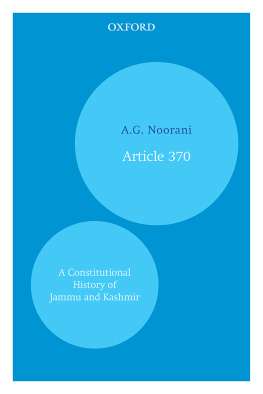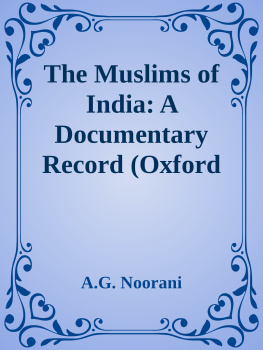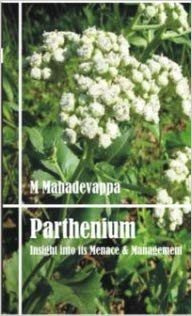A.G. Noorani - The RSS: A Menace to India
Here you can read online A.G. Noorani - The RSS: A Menace to India full text of the book (entire story) in english for free. Download pdf and epub, get meaning, cover and reviews about this ebook. year: 2019, publisher: LeftWord Books, genre: History. Description of the work, (preface) as well as reviews are available. Best literature library LitArk.com created for fans of good reading and offers a wide selection of genres:
Romance novel
Science fiction
Adventure
Detective
Science
History
Home and family
Prose
Art
Politics
Computer
Non-fiction
Religion
Business
Children
Humor
Choose a favorite category and find really read worthwhile books. Enjoy immersion in the world of imagination, feel the emotions of the characters or learn something new for yourself, make an fascinating discovery.

- Book:The RSS: A Menace to India
- Author:
- Publisher:LeftWord Books
- Genre:
- Year:2019
- Rating:4 / 5
- Favourites:Add to favourites
- Your mark:
- 80
- 1
- 2
- 3
- 4
- 5
The RSS: A Menace to India: summary, description and annotation
We offer to read an annotation, description, summary or preface (depends on what the author of the book "The RSS: A Menace to India" wrote himself). If you haven't found the necessary information about the book — write in the comments, we will try to find it.
The RSS: A Menace to India — read online for free the complete book (whole text) full work
Below is the text of the book, divided by pages. System saving the place of the last page read, allows you to conveniently read the book "The RSS: A Menace to India" online for free, without having to search again every time where you left off. Put a bookmark, and you can go to the page where you finished reading at any time.
Font size:
Interval:
Bookmark:
If Hindu Raj does become a fact,
it will, no doubt, be the greatest calamity for this country .
Hindu Raj must be prevented at any cost.
Dr. B.R. Ambedkar
[Pakistan or the Partition of India, 1946, pp. 354-5]
The RSS

First published in March 2019
E-book published in September 2019
LeftWord Books
2254/2A Shadi Khampur
New Ranjit Nagar
New Delhi 110008
INDIA
LeftWord Books is the publishing division of Naya Rasta Publishers Pvt. Ltd.
2019, A.G. Noorani
leftword.com
To
Jawaharlal Nehru
Abul Kalam Azad
C. Rajagopalachari, and
M.A. Ansari
Who believed in and dedicated themselves to the India
which the poet Raghupati Sahay Firaq Gorakhpuri
described in this immortal couplet:
Sar zamin-e-Hind par aqwam-e-aalam ke, Firaq,
Kafile aate rahe aur Hindustan banta gaya
(On the soil of Hindustan, O Firaq
Caravans from all over the world kept coming,
And so was Hindustan made)
Contents
This book has long been in the making, but only in the authors mind. I could never sit down to write it out. The slim volume I wrote, The RSS and the BJP: A Division of Labour, published by LeftWord was launched by Jyoti Basu on 6 December 2000 at the Banga Bhawan in New Delhi. None knew then that on the same day, perhaps at the same time, Prime Minister Atal Bihari Vajpayee was waxing eloquent on Ayodhya in the Lok Sabha.
The book was well received. But the sub-title, I later realised, was wrong. A division implies parity of status. The RSS disabused the minds of the BJPs leaders of any notion of parity. It was the Master. The BJP was its Political Department.
It is not easy to write of the RSS. As Prime Minister Jawaharlal Nehru wrote to the RSS chief, M.S. Golwalkar, on 10 November 1948:
It would appear that the declared objectives have little to do with the real ones and with the activities carried on in various forms and ways by people associated with the RSS. These real objectives appear to be completely opposed to the decisions of the Indian Parliament and the provisions of the proposed Constitution of India. The activities, according to our information, are anti-national and often subversive and violent.
This was confirmed by the RSSs prevarications and downright falsehood, thirty years later. To evade income tax it claimed to be a charitable organisation before the Income Tax Officer. It said the opposite to the Charity Commissioner to escape registration as a charitable trust. More, it claimed a right to attribute to well-known terms meanings which it chose to assign to them, rather like Humpty Dumptys scornful retort to Alice in Through the Looking-Glass: When I use a word, it means just what I choose it to mean neither more nor less. In one breath the RSS says that all Indians are Hindus, only to assert, in the next breath, that Hindus constitute the majority. Reasoned debate is impossible.
This book shows that the RSS is much more than a threat to communal amity. It poses a wider challenge. It is a threat to democratic governance and, even worse, a menace to India, the India which the nation strove to establish. It poses a threat to its values. In the last few years India has been battling for its very soul.
The debts I have incurred are many. I wish sincerely to thank Asaduddin Owaisi, M.P., for providing me, among other documents, English translations of documents in Hindi and prodding me continuously to write. In this his secretary Syed Mushtaq Ahmed was a big help; so were these friends: S. Iftikhar Gilani, Chief of National Bureau, DNA, Qurban Ali, veteran journalist and a committed socialist, and Ravi Nair, Executive Director, South Asia Centre for Human Rights. Prakash Kumar Sinha worked tirelessly on my scribblings to produce a typescript. My loyal Jeeves, Javed Alam of Faizabad, proved to be indispensable fetching books from shelves, taking manuscripts to Prakash Kumar Sinha and bringing the typescript back to me, and other chores. To all of them I am most grateful.
I advisedly mention these friends last. My friend Sudhanva Deshpande, Managing Editor, LeftWord Books. This is my fourth book he has published, taking enormous pains over the manuscript. His colleague Nazeef Mollah did the same patiently, tirelessly. LeftWord itself deserves my deep gratitude.
For flaws in argument or even of fact I bear sole responsibility.
I did no field work, as such. I relied on the excellent works of Christophe Jaffrelot, Pralay Kanungo, Chetan Bhatt, Shamsul Islam and some others, which is fairly acknowledged in the book with full references.
To the reader, I have but one plea in the words of Bacon in his essay Of Studies: Read not to contradict and confute; nor to believe and take for granted; nor to find talk and discourse; but to weigh and consider.
A.G. Noorani
Mumbai, 26 January 2019
Jab Gulistan ko lahoo ki zaroorat parhi, sub se pahle hamari hi gardan kati/Phir bhi kahte hain hum se yeh ahle chaman, yeh chaman hai hamara, tumhara nahin.
(When the Garden needed blood, it was our necks that were first slit/Yet the ones in the Garden tell us, this Garden is ours, not yours.)
This couplet accurately sums up Muslim sentiment in India today. Muslims suffered most in the Great Indian Mutiny in 1857. They fought the British together with their Hindu compatriots. But by the end of the 19th century cries rent the air that the Muslims were later arrivals, invaders in fact; the land belonged to Hindus and they alone will lay down the law for all its peoples to follow.
In this early part of the 21st century the cries have not subsided. They have become louder, shriller and more menacing. The forces who raise the cry not only threaten all the minorities, they deny the very concept of a minority within a State, the concept of Indian nationalism. How has this come to pass?
After the Mutinys collapse, the last Mughal Emperor Bahadur Shah Zafar was tried for waging war against the British Crown, by a British Military Commission in the Diwan-e-Khas of the Red Fort at Delhi. The farce lasted for 21 days. For the prosecution the Judge-Advocate said:
I, of course, allude to the cause, either remote or immediate, which gave rise to a revolt unparalleled in the annals of history, either for the savagery which has been its distinctive feature, or for the suddenness with which elements, hitherto deemed utterly discordant on the score of religion, have united themselves in a common crusade against a faith which, as regards the inhabitants of this country, whether Muhammadan or Hindu, was certainly a most unaggressive one. I fear, however, the subject is still but imperfectly elucidated; and I may perhaps be in error in attributing to a religious influence a movement which, after all, may prove to have been merely a political one a struggle of the natives for power and place, by the expulsion from the country of a people alien in religion, in blood, in colour, in habits, in feelings and in everything. (Italics mine, throughout the book)
Bahadur Shah Zafar was the one around whom both communities rallied as a symbol of revolt and unity.
Insignificant and contemptible as to any outward show of power, it would appear that this possessor of mere nominal royalty has even been looked upon by Muhammadan fanaticism as the head and culminating star of its faith. In him have still been centred the hopes and aspirations of millions. They have looked up to him as the source of honour, and, more than this, he has proved the rallying point not only to Muhammadans, but to thousands of others with whom it was supposed no bond of fanatical union could possibly be established.
Next pageFont size:
Interval:
Bookmark:
Similar books «The RSS: A Menace to India»
Look at similar books to The RSS: A Menace to India. We have selected literature similar in name and meaning in the hope of providing readers with more options to find new, interesting, not yet read works.
Discussion, reviews of the book The RSS: A Menace to India and just readers' own opinions. Leave your comments, write what you think about the work, its meaning or the main characters. Specify what exactly you liked and what you didn't like, and why you think so.







